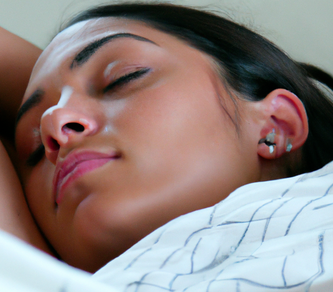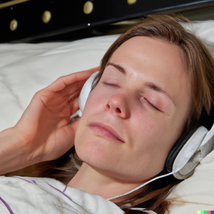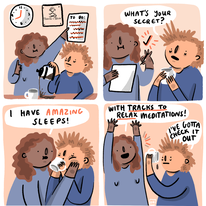|
Insomnia, or difficulty falling asleep, is a common problem that affects many people. It can be caused by a variety of factors, including stress, anxiety, depression, and certain medical conditions.
Here are 10 tips that may help you relax and fall asleep at bedtime:
0 Comments
 Sleep problems are a common issue that many people experience at some point in their lives. These issues can range from difficulty falling asleep and staying asleep, to waking up frequently throughout the night, and feeling exhausted and groggy when waking up in the morning. These problems can have a significant impact on a person's quality of life, as well as their physical and mental health. One effective way to address sleep problems is through the use of guided sleep meditation. This type of meditation involves listening to a guided meditation recording or following a guided meditation script, which helps to relax the mind and body and promote sleep. Guided sleep meditation can be particularly helpful for people who have trouble winding down at night or who have racing thoughts that prevent them from falling asleep. There are several ways in which guided sleep meditation can help someone sleep better. First, it can help to reduce stress and anxiety, which are common causes of sleep problems. When we are stressed or anxious, it can be difficult to relax and let go of our thoughts, which can make it hard to fall asleep. Guided sleep meditation can help to calm the mind and body, making it easier to relax and fall asleep. Second, guided sleep meditation can help to improve sleep quality by promoting relaxation and deepening sleep. When we are relaxed, our bodies are more likely to enter into a deeper sleep state, which is more restful and restorative. Guided sleep meditation can help to calm the body and mind, allowing us to enter into a deeper sleep state more easily. Finally, guided sleep meditation can help to improve sleep habits and routines. By setting aside time to practice guided sleep meditation regularly, we can establish a healthy sleep routine and create a more conducive environment for sleep. This can help to improve sleep quality and duration, as well as reduce the frequency of sleep problems. Overall, guided sleep meditation can be an effective way to address sleep problems and improve sleep quality. Whether you are struggling with difficulty falling asleep, waking up frequently throughout the night, or simply feeling exhausted and groggy when waking up in the morning, guided sleep meditation can help you sleep better and feel more rested and refreshed.  Sleep problems are a common issue that can affect people of all ages and can have serious consequences on overall health and well-being. Insomnia, difficulty falling or staying asleep, and restless sleep can all lead to fatigue, irritability, and difficulty concentrating, and can also have long-term effects on physical health. One way to improve sleep and relaxation is through guided sleep meditation. Sleep meditation is a type of relaxation technique that involves focusing the mind and calming the body in order to fall asleep more easily. It can be helpful for individuals who have trouble winding down or who struggle with racing thoughts at night. Guided sleep meditation involves listening to a recorded meditation, often with a soothing voice guiding the listener through different relaxation techniques, such as deep breathing or visualization. These meditations may also include calming music or natural sounds, such as the sound of waves or rain, to help create a peaceful and relaxing atmosphere. One of the benefits of guided sleep meditation is that it can be customized to fit the individual needs of the listener. For example, some meditations may focus on relaxation techniques, while others may be geared towards managing stress or anxiety. This allows individuals to choose the type of meditation that best suits their needs and preferences. In addition to helping with sleep, guided sleep meditation can also have other benefits, such as reducing stress and anxiety, improving mood, and promoting overall well-being. It can be a valuable tool for individuals looking to improve their sleep quality and manage stress. Overall, guided sleep meditation (Tracks To Relax Sleep Meditations in particular) can be a helpful and effective way for individuals to relax their mind and body and get better quality sleep. Whether you are struggling with insomnia or just looking for ways to improve your sleep and relaxation, giving sleep meditation a try may be a worthwhile investment in your overall health and well-being.  Sleep is an integral part of our daily lives, and yet many of us have trouble falling asleep. This can be incredibly disruptive, leading to fatigue, irritability and difficulty concentrating during our waking hours. The challenges this creates in our day-to-day lives can be far-reaching. For example, when we don’t get enough sleep, our physical health can suffer. Poor sleep can lead to a weakened immune system, weight gain, and an increased risk of chronic illnesses. It can also increase the likelihood of accidents and injuries, as our alertness and reaction time can be impaired. On a mental level, sleep deprivation can cause cognitive problems, such as difficulty focusing and remembering information. It can also lead to mood disturbances and an increased risk of depression and anxiety. All of this can make it difficult to function well in our daily lives, both at work and in our relationships. Fortunately, there are solutions to this problem. The most important one is to establish a regular sleep schedule, going to bed and waking up at the same time each day. Additionally, it’s important to turn off the screen on electronic devices at least an hour before bedtime, as the blue light emitted from these devices can interfere with our circadian rhythms, or where your Ocusleep Glasses to block blue light before bedtime. To help you fall asleep quickly, many people find that our Guided Sleep Meditations help them relax and drift off quickly by quieting their mind and helping them relax deeply. Listen to one of our Free Sleep Meditations and discover how Tracks To Relax can help you sleep better tonight. What are affirmations? Affirmations are positive statements used to help overcome negative and destructive thought patterns. They can be simple and general, or more specific and tailored to an individual's needs. They combat unhelpful self-talk with the goal of building self esteem and increasing motivation. Does using affirmations actually work? Although you may be skeptical of the efficacy of positive affirmations, there is a surprising amount of evidence leading scientists to believe in their power. If something feels silly, but it works, is it still silly? Part of the reason why positive affirmations are effective is due to something called neuroplasticity. Simply put, this is the brain's ability to change and adapt neural pathways in response to learned behaviours. Think of it like exercising the parts of your brain that help you to develop confidence, gratitude and a positive attitude. Another reason why affirmations are effective is because when you state your goals and intentions, you are more likely to search for the proof that those goals are being reached. You pay more attention to the small changes and that helps us to build resiliency. This keeps us on track when reaching our personal goals as it keeps it in our mind and lets us recognize our progress. Positive affirmations help reduce our stress by helping to change the way we talk to ourselves. When we challenge our negative self talk, we are telling ourselves that we do not deserve to be spoken to in this way. With time, we find ourselves less likely to engage in negative self talk in the first place. Can you imagine what you could do with the energy you saved if you didn't spend that time worrying, doubting yourself or ruminating on pessimistic thoughts? How do I get started? When getting started with positive self affirmations, there isn't just one correct way. You can try one thing and if it doesn't work for you, there are lots of other ways to incorporate them into your daily routine. For instance you can:
What are some examples? If you're having trouble knowing where to start or which affirmations will work best for you, here are a few examples. Now remember, you can tailor them towards your own specific needs or situation.
Resources
Moore, C. (2019, March 4). Positive Daily Affirmations: Is There Science Behind It? PositivePsychology.com. https://positivepsychology.com/daily-affirmations/ The Science Behind Positive Affirmations. (2021, February 4). Third Space. https://www.thirdspace.london/this-space/2021/02/the-science-behind-positive-affirmations/#:~:text=It%20fires%20up%20your%20neural Do Affirmations Work? Yes, but There’s a Catch. (2020, September 1). Healthline. https://www.healthline.com/health/mental-health/do-affirmations-work#how-they-work  Sleep stages are an important part of our overall sleep health. In order to feel well rested we need to make sure we are getting enough of both REM (Rapid Eye Movement) and Deep Sleep. When we do not get enough of these stages of our sleep cycles, it can lead to brain fog. It can also exacerbate physical and mental health difficulties since we are not giving our brain and body the time to repair and renew itself. Deep Sleep Deep sleep is important because it allows your body to heal and grow as it works to repair your physical body. It is important for keeping your immune system functioning correctly and regulation of hormones. It helps to replenish your body and your energy for the next day. It is also important for learning and memory, as well as overall cognitive function. REM Sleep REM sleep is critically important for your mental health. This is the stage of sleep where people dream and experience emotional processing. It is a critical part of healthy brain development as this is the stage where we work on consolidating our memories from the day. This sleep stage helps us to get our bodies ready to wake up for the day and is the lightest sleep stage. When you do not get enough REM sleep, you may find it particularly difficult to wake up and may feel groggy and less rested despite the amount of sleep you may have gotten. What happens if you do not get enough of these sleep stages? When you don't get an adequate amount of quality sleep you may experience concentration issues, you may find yourself more forgetful than normal and over time you may contribute to chronic health conditions. If you find yourself in a sleep debt, where you are deprived of these restorative stages over an extended period of time it can be difficult to "catch up", but there are things you can do to help improve the quality of your sleep. How can I help improve the quality of my sleep?
If you find that these changes are not helping to improve the quality of your sleep or if your symptoms are causing you to have difficulty functioning on a daily basis, please speak to your doctor for additional assistance. We are not medical health professionals and something more may be hindering your sleep abilities. It's important to speak with a professional if you believe that your health is being affected.  Wow it's almost fall already and there's not end in sight to this Covid-19 Pandemic. It's no wonder people are stressed out and need help falling asleep. The moment people close their eyes their mind probably starts racing and gets filled with all the worries and anxiety that this situation has brought into our lives. We've had a lot of positive feedback from listeners who say that our Guided Sleep Meditations help them forget about all this for awhile so they can get the sleep they need. That's one of the reasons we create our meditations, to make people's lives a little bit easier, no matter the circumstances and help them reduce stress and stay rested. Recently we added a new subscription option for our Premium Content by making it available on the Super Cast platform. Super Cast is a premium podcast subscription site that allows us to offer our premium content based on monthly subscriptions. When you subscribe to our premium podcast on Super Cast you receive a Private RSS Feed containing our premium sleep meditation that you can add to your favourite podcast player. One nice thing about this service is that you can add the feed to the podcast player of your choice by simply clicking on the link in the email you receive when you join. A wide variety of Podcast Players are supported by the Super Cast Platform (see the list below), and as new sleep meditations are released, the show up in the player automatically. Two subscription levels are available, Premium which offers about 128 sleep meditations and Premium Plus which offers over 160 sessions. Premium subscribers will receive 2 new meditations each month and Premium Plus will receive 4. If you're interested in subscribing to Tracks To Relax Premium you can start a 3 day free trial on Super Cast by Clicking Here. We should also mention that our subscribers on Patreon have a similar option and also receive a Priave RSS Feed, the main difference is that on Patreon, you'll need to copy the feed address and manually add it to your favourite podcast player. Patreon subscriptions start at just $2 with our Bronze level (1 new session a month) and a Silver ($5) and Gold ($10) level are also available. With patreon you also have the option of paying annually and saving 10% which is nice if you plan on listening for awhile and don't want to miss any new releases. If you're not already a patron, you can learn more by clicking here. Sleep is a corner stone of good health! The better you sleep the better you feel. The better you feel the more energy you have to achieve your goals, no matter how big or small they are. If you're not getting the quality sleep you deserve, then you owe it to yourself to give Tracks To Relax a try. You can start listening for free HERE and if you like what you're hearing then we hope you'll join our online family by becoming a Patron and getting access to many more sleep meditation sessions. To say we are in challenging times in an understatement. So many of us are stuck inside, watching the news way to much and wondering just how bad things will get. This of course increases our level of stress and worry which in turn causes our adrenal glands to produce adrenalin. When we stay stressed for a long period of time, our adrenal glands can become depleted and this then makes us feel even more worn out, tired and less resourceful.
In order to avoid this state of adrenal trickle (where you adrenal glands are constantly active) you need to take regular breaks from stress. One of the best ways to do this is to listen to a Tracks To Relax Nap or Bedtime meditation. These meditations can distract your mind and relax you deeply so you can enter into a parasympathetic state. This is the state of rest and repair where your body can replenish it's resources instead of depleting them. Luckily as human beings we have imaginations and that allow us to pretend that we are somewhere else, doing something fun or relaxing. We can imagine a future when this event is a thing of the past and life gets back to "Normal". We can imagine ourselves having a massage at the beach, or walking along the Ocean shore collecting shells or doing just about anything else that's relaxing. With a soothing voice and wonderful meditation experiences, we can help you relax deeply. Whether you join our online family by becoming a patron on Patreon, or just listen to our free podcast, our meditations can help you take that break you need. It's like a hug for your mind in a challenging time. Join our online family at by becoming a patron HERE. Or listen to our free meditation podcast HERE. Well for now, this existence we call life, is a whole new ball game. Here in the great white north and pretty much anywhere north of Virginia, the weather is still cool and snowy or rainy, so it’s not all that enjoyable to get outside. That will change soon and this social distancing thing will become a little less isolating. Plus we’re all bound to get used to the idea after the first month or two of this Covid-19 right?
Virtual Walks and Runs So lately I (Alan) have been running on the treadmill for exercise and playing music while doing so (thank you Spotify). Recently I started also watching Virtual Runs on YouTube while running. It’s surprising how easy it is to trick your brain into thinking your doing something you’re not actually doing. One of the runs is along a pathway that leads along the shorelines of a Hawaiian Island and it’s amazing how uplifting it is and how much it felt like I was outside running! If you can’t get outside right now and you want the illusion of being there, try a virtual walk on youtube and immerse yourself in the experience. Even if you’re just walking in place, or sitting down and watching it on your TV or at your computer, I think it might help you feel better! Here are two virtual walks/runs we enjoy: https://youtu.be/K_UUpS1IGzI https://youtu.be/1aJ2NikmHnc https://youtu.be/lh5-eXzMZrA Date Night What’s a married or any couple to do when everything is closed and you’re stuck at home? Have a date night in! Make a special dinner together and then get dressed up in fancy clothes, play some lovely music and even have a dance! After dinner, retreat to your TV room for a movie and be sure to make some popcorn too! Nikki’s been making some home made fruit rollups with fresh strawberries and other fruit and since we don’t have any NIBS, these fruit rollups will be on the snack menu too. We love movies with tropical settings, like Captain Ron, Forgetting Sarah Marshall, 50 First Dates and Into The Blue. Choose something fun that you know you’ll enjoy and forget about everything else except that special person for awhile. Our new WiFi connected lights in the bedroom will be in OCEAN Mode to finish off the evening. ;) Wii Bowling We love the Wii. We know there are more up to date video game systems out there, but the Wii lets us bowl at home. If you have friends that still have a Wii and you can video chat with them, it might be fun to have a virtual Wii bowling night. Play three games for top average and have fun almost like you would if you were together. and the bonus? You won’t need to worry about your friends drinking all your beer! :) Dehydrated Another thing we are doing to keep busy is dehydrating stuff! When I say we, I mean Nikki because I’m just mainly eating the stuff that she has dehydrated! We recently bought a food dehydrator and have been shredding and dehydrating potatoes to make hash browns, making dried fruit, zucchini slices with taco seasoning and are about to make our own beef jerky. We may be stuck inside, but our goal is to never run out of healthy snacks! Plus it’s a great way to preserve your perishables. We hope you are finding creative ways to keep busy and take your mind off all the negativity right now. We’re going to be releasing a couple of daytime sessions over the next few days so that when you want to take a break you can with a wonderful NAP Meditation. You can now search our meditations on Patreon using your Browser (not the patreon app) at www.patreon.com/trackstorelax You’ll now see a new search box at the top right. If you want to get started wth some of the NAP Sessions we already have you can find them by entering the search word “nap”. We’re going to release a daytime version of “Riding out the storm” so you can use that session during the day or at night as well. Don’t forget to end your day with a Tracks To Relax Sleep Meditation! Sleep is one of the cornerstones of health and wellness. Getting a good night’s sleep can help boost your immune system, improve your mood and give you the energy you need to stay positive! We'll be here, continuing to create for you. Take care everyone and stay safe! Sending you peace and love, Alan & Nikki www.TracksToRelax.com |
